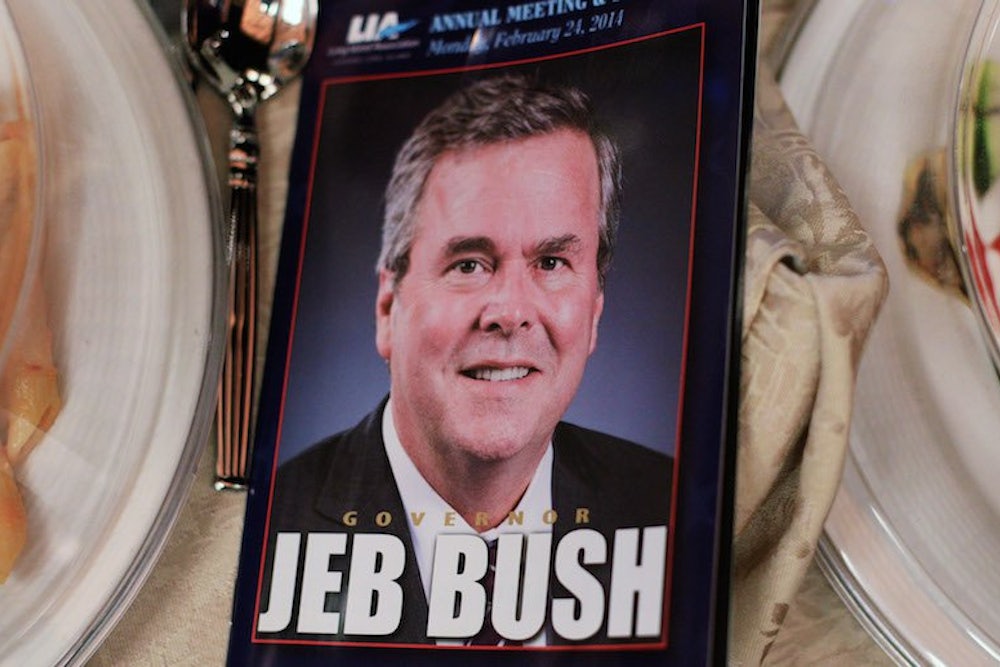The Republican party's presidential primary is taking shape, and everyone in the media wants to know where the former governor of Florida stands on issues, and what he thinks of other likely contenders. Sometimes this goes well for him. Other times he refers to illegal immigration as "an act of love" and Ted Cruz goes like this

But the Bush bubble isn't a media creation. It is a reflection of a genuine shift among establishment-aligned GOP figures, many of whom are now rallying around him unreservedly.
For instance, after Bush made his strikingly dovish comments about immigration, Republican economist Greg Mankiw didn't concern himself with the problems that'll create for him on the campaign trail, or the moral challenge his remarks pose to the rest of the party, but instead wrote a hopeful post about how Bush might win the presidency and be able to make greater strides on the issue than Democrats.
But I'd argue that GOP donor class flirtation with Jeb Bush is less important for what it reveals about Jeb Bush himself, than for what it says about the party's larger talent pool, which conservatives have spent months touting as deep, broad, and imposing.
When conservative supporters talk up Jeb Bush, you get the sense they're extremely relieved he's the only potential presidential candidate other than Hillary Clinton with whom the national press corps is comfortably on a first-name basis. This is an artifact of serving in public office when his older brother transitioned from governing Texas to assuming the office of the presidency. It's largely a coincidence that public figures frequently refer to him as "Jeb" but never refer to his likely adversaries as Rand, Ted, Marco, Scott, Chris, Paul, or Rick. But if you didn't know any better you'd think his supporters stopped calling him "Jeb Bush" or "Governor Bush" and started calling him Jeb on purpose, to avoid drawing attention to his unfortunate lineage.
But he is Jeb Bush. And his ties to his brother's presidency run deeper than blood. They are evident in the profound allegiance his brother's closest aides pledge to him.
“We have a responsibility to make sure Jeb runs,” Andy Card said after a speech honoring Jeb's father, George H.W. Bush. “If Jeb Bush does not run, shame on us.”
He's also the only serious GOP contender who isn't currently serving in public office, and hasn't been since January 2007. The Republicans' last presidential nominee also hadn't served in public office since his governorship ended in January 2007, and we all know how that worked out for them.
These are inherent liabilities. Unlike standard challenges presidential contenders face -- anonymity, lack of experience, a controversial remark or policy position -- these can't be overcome with dogged campaigning or public groveling. They are inherent.
His supporters must know this. They aren't all too ensconced in Bush world to realize that the name itself carries incredible baggage. These are Romney donors and Republican party officials.
Here's the Washington Post's Robert Costa reporting on Jebmentum: "'He’s the most desired candidate out there,' said another bundler, Brian Ballard, who sat on the national finance committees for Romney in 2012 and John McCain in 2008. 'Everybody that I know is excited about it.'"
Their willingness to look past all this is a huge, implicit rebuke to the senators, governors and former vice presidential nominees who have been jockeying for front-runner status ever since election night in 2012. It reflects a recognition among donor class Republicans that being a conservative movement celebrity isn't synonymous with general election viability. If anything, it's an impediment. This donor/activist class schism isn't new on the right. But the emergence of firebrands like Cruz and Paul created the impression that the Republican bench ran deeper than it really does. Plenty of charismatic Republicans want to be president, but right now none of them combines donor class sensibilities with national political appeal.
